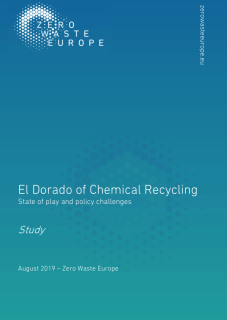
This report looks into the state of implementation of chemical recycling technologies in Europe as a potential solution to help curb plastic pollution and waste management. In contrast with mechanical recycling, chemical recycling is an industry in its infancy and most plants in the market are in a pilot stage. The potential roll-out of such technologies at industrial scale can only be expected from 2025-2030, an important factor to consider when planning the transition to a circular economy. For the sake of policy consistency, it is key that the right policy framework is set up in order to accommodate chemical recycling as complementary to mechanical recycling and ensure that the carbon stays in the plastic and is not released into the environment. Therefore, allowing plastic-to-fuels to be considered chemical recycling risks creating a loophole in EU Climate and Circular Economy legislation.
This report indicates chemical recycling could be a complementary solution to mechanical recycling where the latter proves to be unsuited to materially recover plastic because it is too degraded, contaminated, or too complex. At the same time, increased collection of high-quality waste and design for reuse and recycling should remain the two priorities in order to increase the recycling rates for plastics and ensuring no plastic escapes the material loop via plastic to fuels. For this to happen, the report recommends amending current waste legislation as follows:
- Come up with a clear definition of chemical recycling that excludes any operation that does not result in the production of new plastic.
- Only processes with a lower carbon footprint than the production of plastic from virgin feedstock can be classified as chemical recycling.
- Chemical recycling should be used to deal with degraded and contaminated plastics and never with plastics coming from separate collection.
- Establish verification systems to ensure chemical recycling process outputs plastic and plastic feedstocks; facilities licensed for chemical recycling may not produce fuel for on- or off-site combustion.
- In order to avoid competition with mechanical recycling, but also to differentiate from recovery and disposal operations, a new level in the waste hierarchy should be added for those operations that recover materials from mixed waste that today would end up burned.
- For coherence with EU Climate and Circular Economy agendas EU funding should only be allowed to finance plastic to plastic chemical operations.
